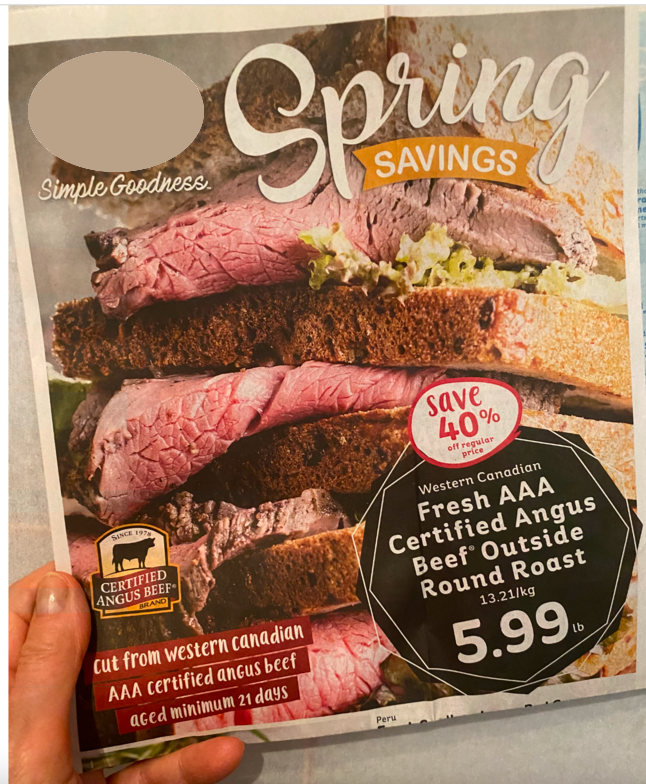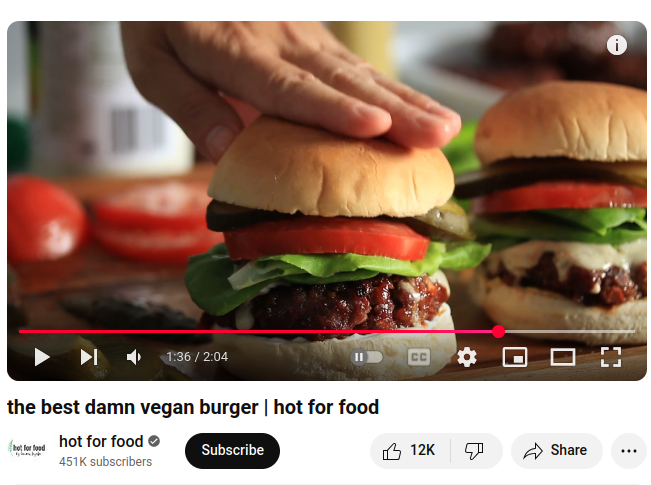
Welcome! This post is the latest in a series suggesting that we'll only develop food systems that are ecological, healthy, just, and morally defensible when we face the challenges of industrial animal agriculture. Inspired by the ancient Stoic principle 'The Obstacle is the Way,' the series explores reasons that so many civil-society groups, governments, and activists deliberately avoid discussing the topic of meat. Begin the series here.
Rationale: "Regular Meat Consumption is Normal. It's What People Do."
To the question “What's for dinner?” the answer is often a single word: chicken, or beef. When meat is the feature, why bother mentioning “sides”?
In Western societies, nearly continual meat-eating is such a strong norm that most people expect to consume animal products daily, at restaurants, at events, and at home. That's reinforced by advertisements – some of which make no sense. At my local grocery, a recent promotional flyer for Earth Day was dominated by photos of beef, chicken, and pork, despite the evidence that all of those (in today's amounts) destabilize ecosystems and create far more greenhouse emissions than do plant-based proteins.
Lucky for all of us, norms evolve
Despite the human tendency to resist change,[1] our societies evolve constantly. Examples abound. We have successfully institutionalized marriage equality, limited cigarette smoking, and decreased public tolerance for drunk driving. Now imagine a world, not so very far away, in which consumers expect most of their protein to be plant-based.
Below: On her blog and Youtube channel, titled Hot for Food, and in several popular cookbooks Canadian chef extraordinaire Lauren Toyota gets us closer to that world by showing us all how to make delicious plant-based classics.
It's true that humans have been eating meat for millennia. But even if we should want to emulate our ancestors, none of them had plastic-wrapped factory-farmed meat at every meal, that in current supplies are terrible for environments and public health.
Norms are created and reinforced by industry
Norms of heavy meat consumption are not biologically based. They are fuelled by industry advertising, which establishes and pumps those norms.[2] It's the stated objective of the Beef Checkoff program, which aims to, according to their website homepage: "increase the demand for beef at home and abroad."[3]
Before we shut down conversation on industrial meat because it’s “normal,” let’s reflect: Do we want our dietary norms to be established by multi-billion-dollar agribusiness? Do we want our tables set by Big Meat?
Image at top of this post: Eleanor Boyle photo of a local grocery store flyer (with store logo removed)
NOTES
[1] Jörg Gross et al., “Why Do People Oppose New Rules? Policy Change, Norm Change, and Public Outrage,” Current Opinion in Psychology 64 (published online March 27, 2025): article no. 102041, https://doi.org/10.1016/j.copsyc.2025.102041.
[2] See, for example: Julia Soares Guimarães et al., “Ultra‑Processed Food and Beverage Advertising on Brazilian Television by International Network for Food and Obesity/Non‑Communicable Diseases Research, Monitoring and Action Support Benchmark,” Public Health Nutrition 23, no. 15 (October 2020): 2657–62, https://doi.org/10.1017/S1368980020000518. Also see Morgan Ellithorpe et al., “I’m Lovin’ It: How Fast‑Food Advertising Influences Meat‑Eating Preferences,” Journal of Health Communication 27, no. 3 (March 4, 2022): 141–51, https://doi.org/10.1080/10810730.2022.2068701. Open-access version here: https://udspace.udel.edu/server/api/core/bitstreams/46e14cf7-4cf2-454f-b260-665524e53ebc/content. Also see: “How Food Advertisements Influence Consumer Choices: Leveraging Video Advertising,” Social Motion Films, February 13, 2024, https://www.socialmotionfilms.com/post/food-advertisements-influence-consumer-choices, as well as Pierre Chandon and Brian Wansink, “Does Food Marketing Need to Make Us Fat? A Review and Solutions,” Nutrition Reviews 70, no. 10 (October 2012): 571–593, https://doi.org/10.1111/j.1753-4887.2012.00518.x.
[3] See Beef Checkoff: Cattlemen’s Beef Board, “What is the Beef Checkoff?”, accessed July 20, 2025, https://www.beefboard.org/checkoff/. According to the 2021–22 annual report of industry marketing program Canada Beef, "Had there been no Canadian Check-off funded domestic marketing activities, domestic beef demand would have been 9.1% lower than it actually was." Canada Beef, Canada Beef Annual Report 2021–2022, August 2022, https://canadabeef.ca/wp-content/uploads/2022/08/2021-2022-Annual-Report.pdf.

